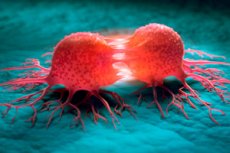The drug reprograms macrophages and suppresses the growth of prostate and bladder tumors
最近審查:14.06.2024

A new therapy that reprograms immune cells to enhance antitumor activity has helped shrink hard-to-treat prostate and bladder tumors. Style> in mice. This discovery was made by scientists from the Oncology Center. Kimmel Johns Hopkins and the Bloomberg~Kimmel Institute for Cancer Immunotherapy, as well as the Johns Hopkins Drug Development Research Group.
Immunotherapies, which help the immune system recognize and fight tumors, have revolutionized the treatment of many types of cancer. However, these therapies, which enhance the production and activation of T cells that kill tumor cells, have not been effective against aggressive forms of prostate and bladder cancer.
The field of oncology has long struggled to understand why immunotherapies do not work effectively for these cancers and how to improve their performance. The study's senior author, Jelani Zarif, Ph.D., a professor of oncology at Johns Hopkins, and his colleagues suspected that immune cells called macrophages were to blame. Under some conditions, macrophages help tumors grow and suppress T-cell activity, weakening the immune response to cancer.
“The focus of our work is to reprogram immune-suppressing tumor-associated macrophages into immune cells that stimulate antitumor responses to improve therapeutic responses to immunotherapies and other standard cancer treatments,” says Zarif.
Immune-suppressing macrophages depend on the amino acid glutamine. Zarif and colleagues previously showed that macrophage precursors called monocytes develop into immune-activating macrophages when grown in vitro without glutamine. In contrast, when monocytes are cultured with glutamine, they become immune-suppressing macrophages.
Zarif and his team hypothesized that drugs that block immune cells' access to glutamine would shift the balance of macrophages toward the immune-promoting type and help shrink tumors. Research has shown that a drug called 6-diazo-5-oxo-L-norleucine (DON), which deprives tumors of glutamine, shrinks tumors that depend on glutamine for growth. However, development of this drug as a cancer therapy was abandoned decades ago due to its gastrointestinal toxicity and harmful side effects.
Instead, Zarif used an experimental glutamine-blocking drug developed by study co-authors Barbara Slusher, Ph.D., director of the Johns Hopkins Drug Development Research Group, and Jonathan Powell, M.D., Ph.D., former associate director of the Bloomberg~Kimmel Institute for Cancer Immunotherapy. The drug, JHU083, is a type of molecule called prodrag that cells inside the body convert into the active drug.
Specifically, JHU083 can only convert to its active glutamine-blocking form within the tumor, preventing harmful side effects elsewhere in the body. Studies show the drug shrinks tumors, reduces the spread of cancer and increases survival in animals with skin, colon, blood and brain cancers, as well as some hard-to-treat forms of mammary cancer.
"Barbara Slusher and her team changed the drug's chemistry so that it circulates inactively throughout the body and is activated only when it enters cancer cells," explains Zarif. "Because the active form is only released in cancer cells, lower doses can be given, further reducing the risk of side effects."
Zarif and colleagues showed that JHU083 blocked the use of glutamine in prostate and bladder tumors in mice, reducing tumor growth and causing tumor cell death. It also reprogrammed immune suppressing macrophages into immune stimulating macrophages. The macrophages themselves began to destroy tumor cells. They also helped attract T cells and natural killer cells to tumors.
Adding an immunotherapy called a checkpoint inhibitor, which enhances T-cell activation in tumors, did not increase the effects of JHU083. Zarif explained that this was likely because there was already a lot of antitumor immune activity in the JHU083-treated tumors.
"JHU083 may be a promising anti-cancer therapy for tumors with immunosuppressive macrophages and too few T cells," he says. "It may also be a promising treatment for tumors that do not respond to checkpoint inhibitors."
Zarif plans to collaborate with colleagues at Johns Hopkins to launch a clinical trial of JHU083 in patients with hard-to-treat prostate or bladder cancer to test whether it shrinks tumors and prevents metastases. They also want to continue studying whether combining JHU083 with other treatments improves its effectiveness against tumors.
The study was published in Cancer Immunology Research.

